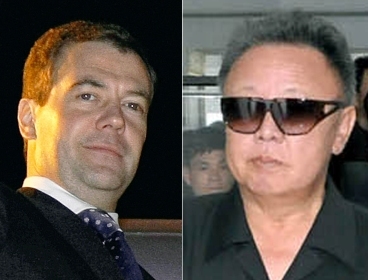MOSCOW (AP) -- Reclusive North Korea's autocratic leader Kim Jong-il crossed into Russia Saturday on his armored train to discuss with President Dmitry Medvedev the possible renewal of nuclear disarmament talks and the construction of a pipeline that will stream Russian natural gas to both Koreas, the Kremlin and media said.
 |
(Yonhap News) |
Kim's visit to the Cold War ally is a further sign of Pyongyang's increasing efforts to reach out for economic assistance and diplomatic support.
North Korea's official media did not specify when a meeting with Medvedev would take place, but said that Kim's visit was at the invitation of the Russian president.
North Korea is increasing efforts to secure aid and to restart stalled nuclear disarmament negotiations. Last month, a senior North Korean diplomat visited New York to discuss ways to resume six-nation talks last held in December 2008. Earlier, the nuclear envoys of North and South Korea met in Indonesia for talks.
Russia and North Korea both announced Friday that Moscow will provide food assistance, including some 50,000 tons of wheat, to Pyongyang. North Korea might face another food crisis this year due to heavy rains.
``The key reasons for Kim's Russian visit are to discuss receiving food aid and improving economic cooperation between the two'' countries, said Yang Moo-jin, a professor at the University of North Korean Studies in Seoul.
North Korea said earlier this week that Medvedev sent a letter calling for greater energy cooperation among Russia and the two Koreas, saying it would enhance regional security.
That came after Russia's foreign minister said Moscow was in talks with Pyongyang and Seoul separately on putting gas pipes through the Korean peninsula.
The pipeline construction is a chance ``to include North Korea in a large international project that will give a new stimulus to the North Korean regime,'' said Fyodor Lukyanov, the editor of Russia in Global Affairs magazine.
``This is both gas and the transit money for gas'' to South Korea, he told The Associated Press.
The 69-year-old Kim also traveled to China in May this year in a trip seen by many as an attempt to secure aid, investment and support for a transfer of power to his youngest son. It was Kim's third visit to his country's closest ally in just over a year.
Seoul expert Yang said that Kim is now seeking Russia's support.
``The North, by visiting Russia, wants to secure Russia's support on Kim Jong Un's succession as well as during the future six-party talks,'' Yang said, referring to Kim's third son, who is seen as his father's eventual successor.
South Korean officials said earlier that Kim's train had arrived in the Russian border city of Khasan, but the first confirmation that Kim was in Russia came in statements issued later by the Kremlin and North Korea's official news agency.
Kim will visit the Far East region of Russia and travel west to Siberia, the Kremlin and North Korea's official Korean Central News Agency said.
KCNA said in an English dispatch that ``top leaders'' of the two countries would meet, but provided no further details. The Kremlin press service said that details of Kim's visit were still being worked out with the North Korean side.
Russia's state news channel Rossiya 24 reported that Medvedev will meet Kim in Ulan Ude, the capital of Buryatia, a Buddhist province near Lake Baikal. Kim would have to travel about 1,860 miles (3,000 kilometers) on the Trans-Siberian Railway along the borders with China and Mongolia to reach Ulan Ude from Khasan.
South Korea's Yonhap News agency reported earlier that Kim may hold talks with Medvedev on Tuesday, quoting a source it did not identify, who speculated that Kim may also meet with Prime Minister Vladimir Putin. A South Korean Foreign Ministry official in Moscow refused to comment on the possible meetings because it was a bilateral issue between Russia and North Korea.
Kim last visited Russia in 2002, a four-day trip limited to the Far East. A year earlier, however, he made a 24-day train trek across the country.
Russia and North Korea maintain cordial ties, though they are not as close as they were in Soviet times, when Moscow provided significant aid and support to Pyongyang. Moscow is a member of the six-party forum aimed at persuading North Korea to abandon its nuclear programs in exchange for aid and security guarantees.
Leonid Petrov, a North Korea expert at the University of Sydney, said the North Korean leader feels pressure to balance the increasing influence of China over his country with that of Russia.
Russia is also ``more willing to talk to North Korea as Beijing gets closer to Pyongyang,'' Petrov said, recalling the Cold War era when Moscow and Beijing jostled for influence with the country.
Russia's Foreign Ministry announced Friday that the country has decided to provide North Korea with 50,000 metric tons of grain as humanitarian assistance and that the first shipment arrived that day. KCNA also reported the provision in a dispatch late Friday from Pyongyang.
North Korea regularly suffers food shortages. The country has said recent heavy rains are likely to harm this year's harvest because of extensive damage to farmland as a result of flooding.








![[Today’s K-pop] Blackpink’s Jennie, Lisa invited to Coachella as solo acts](http://res.heraldm.com/phpwas/restmb_idxmake.php?idx=644&simg=/content/image/2024/11/21/20241121050099_0.jpg)